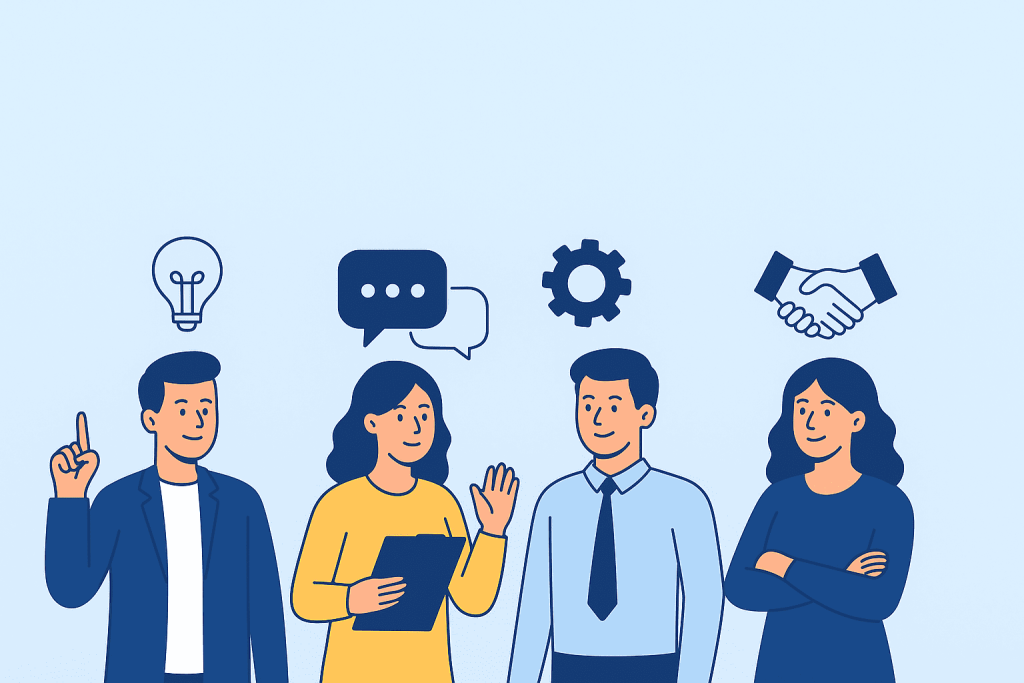In today’s competitive professional landscape, soft skills in the workplace are just as important as technical knowledge. Employers increasingly value employees who can communicate effectively, collaborate with others, and adapt to change. These skills not only improve individual performance but also strengthen overall organizational productivity. Professionals who master them are better equipped to handle challenges, foster strong relationships, and advance their careers.
Why Soft Skills in the Workplace Matter for Career Growth
Soft skills in the workplace are critical because they complement technical expertise and help employees function efficiently in team settings. They enable professionals to resolve conflicts, manage time, communicate clearly, and contribute positively to workplace culture.
Organizations with employees who excel in soft skills benefit from higher retention rates, better teamwork, and improved client satisfaction.
Key Soft Skills in the Workplace Every Professional Should Master
Below are the most essential soft skills in the workplace and how they contribute to professional success:
Communication: A Crucial Soft Skill in the Workplace
Clear and effective communication includes verbal, written, and non-verbal interactions. It ensures that ideas are conveyed accurately and prevents misunderstandings.
Example: A project manager who communicates expectations clearly while listening to team concerns builds trust and ensures deadlines are met.
Tips to Improve: Practice active listening, refine written communication, and join public speaking sessions.
Teamwork and Collaboration as Important Soft Skills in the Workplace
Working well with colleagues is central to achieving shared goals. Strong teamwork boosts productivity, creativity, and innovation.
Example: Teams that encourage open dialogue and mutual support consistently outperform those with weak collaboration.
Tips to Improve: Volunteer for cross-functional projects, build rapport with peers, and recognize others’ contributions.
Problem-Solving: A Must-Have Soft Skill in the Workplace
Problem-solving is about analyzing challenges, brainstorming solutions, and implementing effective strategies.
Example: An employee who identifies inefficiencies in a workflow and suggests improvements demonstrates strong problem-solving skills.
Tips to Improve: Break complex issues into smaller parts, consider multiple solutions, and learn from outcomes.
Adaptability: Thriving with Soft Skills in the Workplace
Flexibility and openness to change allow professionals to thrive in dynamic environments.
Example: Employees who adapted quickly to remote work platforms during the pandemic ensured productivity and team collaboration continued smoothly.
Tips to Improve: Stay current with trends, welcome new technologies, and view change as an opportunity for growth.
Time Management: One of the Core Soft Skills in the Workplace
Time management enables professionals to prioritize tasks, meet deadlines, and reduce stress.
Example: A sales executive who organizes client calls effectively is able to achieve monthly targets consistently.
Tips to Improve: Use calendars, task management apps, and set SMART goals.
Leadership: Developing Key Soft Skills in the Workplace
Leadership is about guiding and motivating others, not just managing. Even at non-managerial levels, leadership qualities stand out.
Example: A junior employee who mentors peers while leading small projects showcases leadership potential.
Tips to Improve: Take initiative, own your responsibilities, and seek mentorship opportunities.
Emotional Intelligence as a Vital Soft Skill in the Workplace
Emotional intelligence (EQ) allows professionals to understand their emotions and empathize with others. It plays a key role in conflict resolution and collaboration.
Example: A customer service agent handling difficult clients with patience and empathy demonstrates high EQ.
Tips to Improve: Practice self-awareness, mindfulness, and empathy in daily interactions.
Creativity and Innovation: Transformative Soft Skills in the Workplace
Creativity fuels innovation and helps organizations stay competitive. Employees with creative problem-solving approaches often lead change.
Example: A marketing associate suggesting an unconventional campaign idea that boosts engagement.
Tips to Improve: Stay curious, brainstorm frequently, and look for inspiration outside your industry.
Conflict Resolution Through Soft Skills in the Workplace
Conflicts are inevitable, but resolving them professionally is a valuable skill.
Example: A project lead mediating between colleagues with differing views ensures team harmony and project success.
Tips to Improve: Stay objective, listen actively, and focus on mutually beneficial outcomes.
Work Ethic and Professionalism as Lasting Soft Skills in the Workplace
Dependability, integrity, and accountability form the foundation of a strong work ethic.
Example: An employee who consistently meets deadlines and produces quality results builds long-term trust.
Tips to Improve: Set personal standards, be consistent, and own your responsibilities.
How Soft Skills in the Workplace Boost Business and Career Growth
Investing in soft skills in the workplace benefits individuals and organizations alike:
-
For Employees: Opens leadership opportunities, builds credibility, and accelerates career growth.
-
For Organizations: Boosts productivity, enhances collaboration, strengthens client trust, and drives innovation.
Employees who excel in these skills apply their technical knowledge more effectively, making them valuable assets to their teams and organizations.
Conclusion
Soft skills in the workplace are no longer optional—they are essential for both professional success and organizational growth. From communication and teamwork to leadership and emotional intelligence, these skills empower professionals to thrive in dynamic environments.
At Knowxbox, we create engaging e-learning solutions and curated learning resources to help employees strengthen these critical soft skills. By investing in soft skills training, organizations can build a more collaborative, innovative, and productive workforce.
